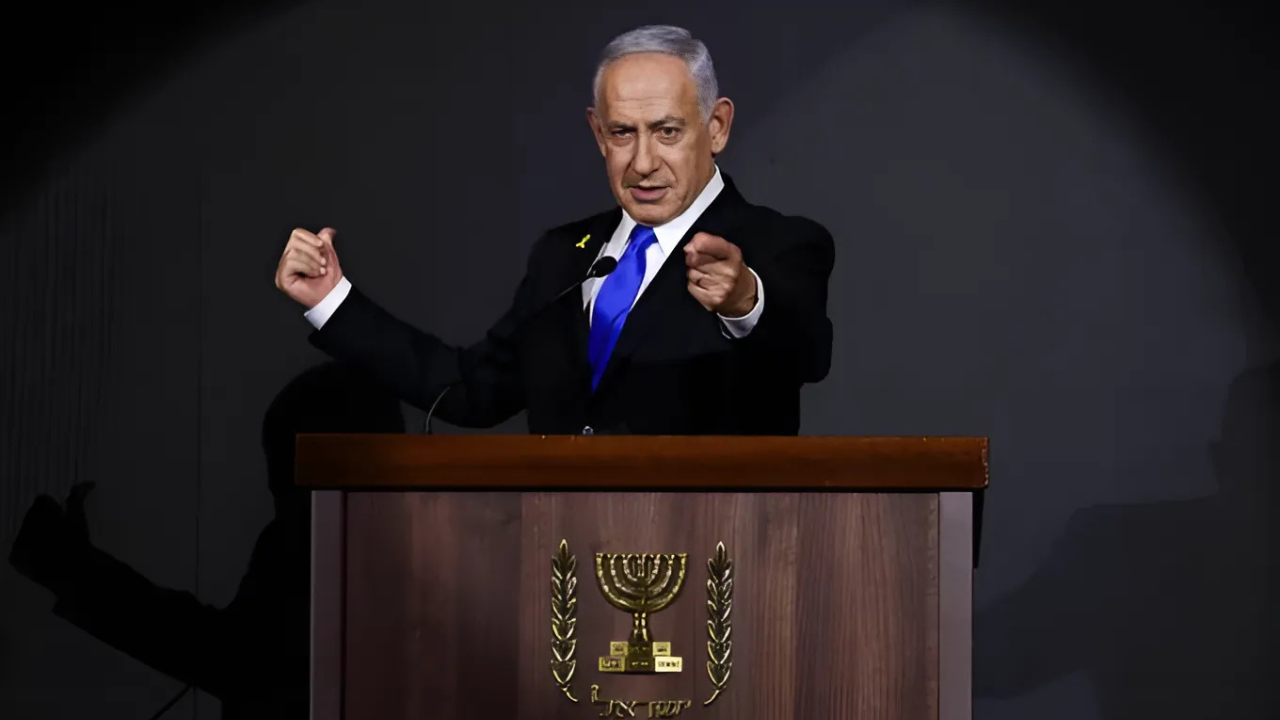
Post by : Naveen Mittal
Israeli Prime Minister Benjamin Netanyahu has signed an agreement to expand Israeli settlements in the occupied West Bank, a move that would divide the land and make it nearly impossible for Palestinians to form a future state.
The project, announced on Thursday, includes more than 3,400 new homes for settlers in the Maale Adumim area, east of Jerusalem. This expansion would cut off much of the West Bank from East Jerusalem, the place Palestinians want as the capital of their future country.
At the signing ceremony, Netanyahu declared: “We are going to fulfil our promise that there will be no Palestinian state. This place belongs to us.”
He also said that the population of Maale Adumim would double under the new plan.
East Jerusalem holds deep significance for Palestinians. They see it as their capital in any future peace agreement. However, by linking settlements around the city, Israel is tightening its control and blocking territorial continuity.
Under international law, all settlements in the West Bank are considered illegal, even if they have approval from Israeli authorities.
Palestinian leaders condemned Netanyahu’s announcement.
Nabil Abu Rudeineh, spokesperson for the Palestinian Authority, said:
A Palestinian state with East Jerusalem as its capital is the only path to peace.
The settlement expansion violates international law.
Netanyahu is “pushing the region towards the abyss.”
He reminded the world that 149 UN member states have already recognised Palestine and urged others to follow.
Netanyahu has long opposed the creation of a Palestinian state. In the 1990s, he spoke out against the Oslo Accords, agreements that were meant to bring peace between Israel and Palestine.
In 2001, he even boasted on video that he had “ended the Oslo process.”
During his first term in 1997, he supported the building of Har Homa, a settlement in East Jerusalem. More recently, his far-right allies such as Finance Minister Bezalel Smotrich have openly said that settlements will erase Palestine from the map.
The world has reacted strongly to the announcement:
United Nations: In September 2024, the UN General Assembly passed a resolution demanding Israel stop all settlement activities and withdraw from occupied land. More than 100 nations supported it.
International Court of Justice (ICJ): In July 2024, the ICJ ruled Israel’s presence in the West Bank unlawful and called for immediate withdrawal.
World powers: Countries like the UK, Australia, Japan, Belgium, France, and Malta have condemned the expansion. Some are now pushing to officially recognise a Palestinian state.
Germany: Backed a France-led UN resolution supporting a two-state solution and the right of return for Palestinian refugees.
Despite these calls, Netanyahu dismissed the UN and ICJ decisions as “lies” and vowed to continue.
This announcement comes at a time of rising violence in both the West Bank and Gaza.
In Jerusalem, six people were killed on Monday when Palestinian gunmen opened fire at a bus stop.
Israeli forces responded by storming Palestinian towns, demolishing the homes of suspects, and arresting dozens of people.
In Tulkarem, almost 100 Palestinians were detained after an attack that injured two Israeli soldiers.
In Gaza, more than 64,000 Palestinians have been killed and over 160,000 wounded since October 2023. Israel continues its campaign of forced displacement, which critics call ethnic cleansing.
As Israel expands settlements, more countries are moving towards recognising Palestine as a state.
France and Saudi Arabia are leading a UN initiative called the New York Declaration, which calls for a Palestinian state and the right of return for refugees.
Belgium, France, and Malta have pledged to recognise Palestine at the UN General Assembly.
The UK, Australia, and Canada are considering recognition but with conditions.
This growing support shows that international patience with Israel’s settlement policy is wearing thin.
Netanyahu’s latest settlement expansion is one of the boldest moves yet to block Palestinian statehood. By dividing the West Bank and cutting off East Jerusalem, Israel is closing the door to a two-state solution that much of the world still supports.
Palestinian leaders say peace will only come with independence and recognition, but Israel’s government insists it will never allow a Palestinian state. With rising violence and international criticism, the region edges closer to greater instability.










Curry Powers Warriors to Nail-Biting 109-108 Victory Against Spurs
Stephen Curry's 49 points propel the Warriors to a dramatic 109-108 NBA Cup triumph over the Spurs,

India Advances to Semi-Finals After Thrashing USA in Women’s Blind T20 World Cup
India secured a dominant ten-wicket victory over the USA, advancing to the semi-finals in the Women’

South Africa's Early Advantage as India Struggles on Day Two
On Day Two, India reached 138-4 as South Africa took three early wickets, complicating matters with

Kenta Nishimoto Defeats Lakshya Sen in Japan Masters Semifinal
Lakshya Sen's journey in the Japan Masters ends after losing to Kenta Nishimoto 19-21, 21-14, 12-21

Kenta Nishimoto Defeats Lakshya Sen in Japan Masters Semifinals
Lakshya Sen's run at the Japan Masters concludes with a loss to Kenta Nishimoto in the semifinals, 1

Major IPL Trade: Jadeja Joins Royals as CSK Signs Samson
In a significant IPL trade, CSK has acquired Sanju Samson from Rajasthan Royals in exchange for Ravi